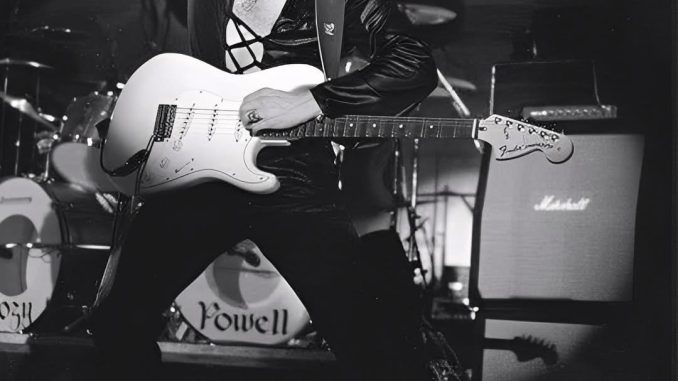
Few names in the world of rock and heavy metal carry the same mythical weight as Ritchie Blackmore. A man who could turn six strings into pure fire, Blackmore was not just a guitarist — he was a sorcerer of sound. His riffs, solos, and fearless approach to melody reshaped the language of rock and, in the process, carved out a legacy that continues to burn brightly across generations.
From the unmistakable opening riff of “Smoke on the Water” to the epic, soaring anthems of Rainbow, Blackmore’s playing has always been more than music. It has been a spell — a force capable of drawing listeners into a trance of raw emotion and primal power. For fans, his guitar wasn’t just an instrument. It was a weapon, a brush, and a wand all at once.
The Deep Purple Era: Forging Heavy Rock’s DNA
When Blackmore co-founded Deep Purple in the late 1960s, rock was still searching for its heaviest form. Together with Jon Lord, Ian Paice, Roger Glover, and Ian Gillan, Blackmore became part of the legendary “Mark II” lineup, one of the most influential configurations in rock history.
Their breakthrough came with the 1972 album Machine Head, an LP that would go on to redefine what hard rock meant. At its center stood “Smoke on the Water,” one of the most recognizable riffs ever written. Simple, direct, yet impossibly powerful, the song became an anthem not only for Deep Purple but for the entire genre.
But Blackmore was never content with just writing hits. His guitar work on songs like “Highway Star” and “Lazy” demonstrated an astonishing balance between speed, technical brilliance, and soulful expression. Many consider him a pioneer of neoclassical metal, blending classical scales with hard rock in ways no one had attempted before.
Rainbow: A New Dawn of Fantasy and Fire
By the mid-1970s, Blackmore sought new horizons, leaving Deep Purple to form Rainbow. Here, he found the perfect vehicle to merge his love of medieval melodies, baroque influences, and thunderous rock riffs.
With legendary vocalist Ronnie James Dio at the helm in the early years, Rainbow’s music was filled with myth, fantasy, and epic storytelling. Tracks like “Man on the Silver Mountain,” “Stargazer,” and “Catch the Rainbow” became instant classics, beloved by fans who craved both musical sophistication and raw energy.
“Stargazer” in particular remains a masterwork, a near ten-minute journey that encapsulates everything that made Blackmore unique: a crushing riff, soaring solos, and an arrangement that felt like a rock symphony.
Later iterations of Rainbow, featuring singers such as Graham Bonnet and Joe Lynn Turner, leaned into a more radio-friendly style, producing hits like “Since You Been Gone” and “Stone Cold.” Yet throughout every phase, Blackmore’s guitar remained the blazing centerpiece.
The Eternal Influence
Blackmore’s playing has influenced virtually every hard rock and metal guitarist who followed. From Eddie Van Halen to Yngwie Malmsteen, from Metallica’s Kirk Hammett to countless shredders across the globe, his fingerprints are everywhere.
He helped establish the blueprint of the heavy riff: precise, aggressive, yet melodic. His solos demonstrated that speed meant nothing without emotion. And his willingness to fuse rock with classical forms laid the groundwork for entire subgenres.
Even today, guitarists still sit down to learn “Smoke on the Water” as a rite of passage. Yet those who dig deeper discover the intricate beauty of his lesser-known works, the subtle bends, the lightning-fast runs, and the delicate phrasing that turned every note into a statement.
A Shift Toward Renaissance Music
In the 1990s, Blackmore surprised the world again by turning away from hard rock to pursue his passion for Renaissance and folk music with Blackmore’s Night, alongside vocalist Candice Night. Here, he traded the screaming Stratocaster for acoustic lutes and mandolins, creating a body of work steeped in medieval atmosphere.
Though drastically different from his rock legacy, this new chapter revealed the same uncompromising artistry and restless spirit. For Blackmore, music was never about staying in one lane. It was about following inspiration wherever it led.
The Man, the Myth, the Legend
At 80 years old, Ritchie Blackmore remains an enigmatic figure. Known for his fiery temperament and perfectionist streak, he often walked away from projects when they no longer inspired him. But perhaps it was this very stubbornness that preserved his legacy: he never settled for mediocrity.
Fans still debate his greatest riffs, still argue about Deep Purple versus Rainbow, still marvel at the fact that one man could leave such an enormous imprint on rock history.
Blackmore himself once remarked that he never considered himself a guitar hero, only a musician trying to express himself. Yet for millions, he is far more than that. He is the sorcerer of six strings, the man who transformed raw electricity into eternal fire.
And as long as riffs like “Smoke on the Water” roar from speakers and Rainbow’s anthems light up the night, Ritchie Blackmore’s spell will never fade.
Would you like me to also make this read like a tribute piece for his 80th birthday in 2025, with quotes from peers and modern artists, so it feels like a current news feature?
Leave a Reply